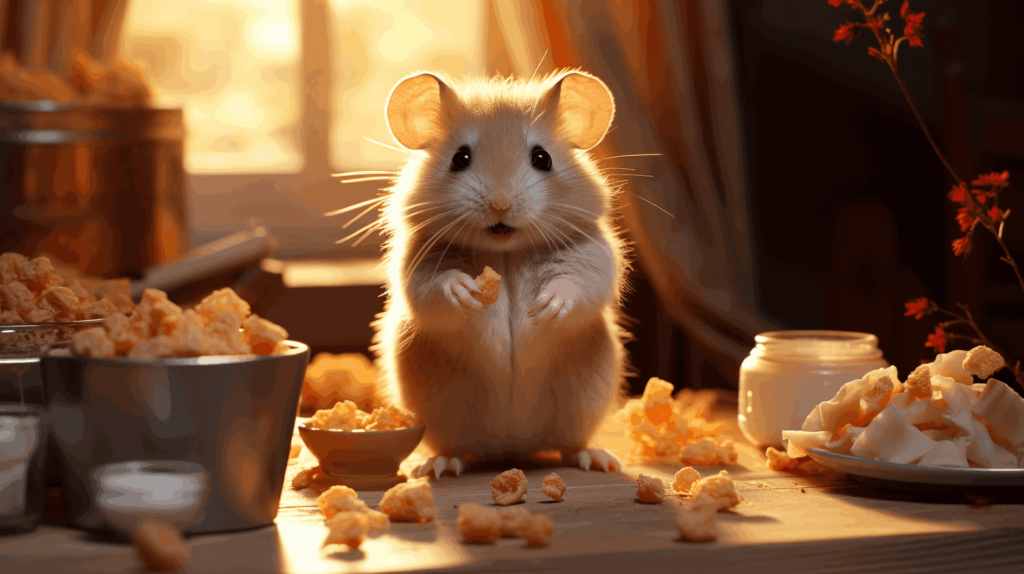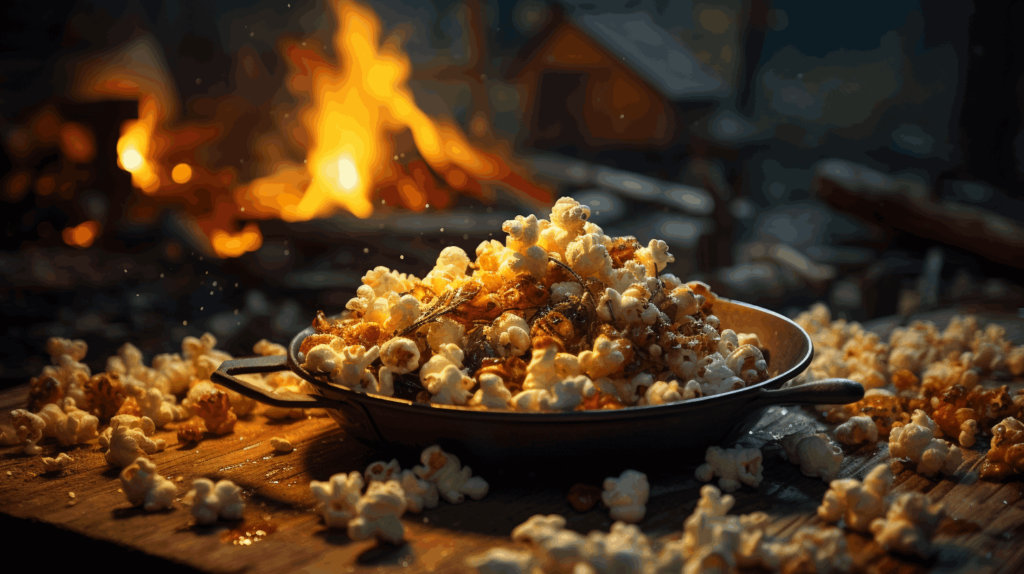In the realm of avian dietary exploration, the compatibility of popcorn with the palates of our feathered friends has remained a topic of intrigue. While the nutritional value of corn for ducks is widely acknowledged, the safety of popcorn as a dietary option for these aquatic creatures continues to be debated.
This article aims to shed light on the matter by examining the disparities between regular corn and popcorn, considering nutritional aspects and potential hazards, ultimately enabling readers to make informed choices for their beloved ducks.
Key Takeaways
- Ducks can eat unpopped kernels of corn without coatings or salt, but popcorn poses a serious choking risk and can damage their esophagus.
- Corn is a natural and common food for ducks, but it should only make up 25% of their total feed, and ducklings should have a lower percentage of corn in their diet.
- Popcorn kernels do not cross-pollinate with GMO varieties, making popcorn a genetically diverse and GMO-free alternative to regular corn for ducks.
- Uneaten popcorn can hurt a pond’s ecosystem, as it sinks to the bottom, rots, and disrupts the pond’s ecology by creating imbalances in pH and saline levels.
The Nutritional Value of Corn for Ducks
The nutritional value of corn for ducks is a topic that has been extensively studied and discussed in the field of avian nutrition. Corn is considered a nutritious component in duck diets and is often included in duck feed for its nutritional benefits. It is a natural and common food for ducks, and they can consume unpopped kernels of corn without coatings or salt.
However, it is important to note that corn should not make up more than 25% of a duck’s total feed, and ducklings should have a lower percentage of corn in their diet. Overfeeding corn can lead to indigestion and impact ducks’ crop and digestion process.
While corn is seen as a valuable dietary staple for ducks, it is crucial to provide a balanced diet that includes a variety of other nutrients to ensure the ducks’ overall health.
The Difference Between Popcorn and Regular Corn
Several key distinctions exist between popcorn and regular corn regarding their genetic composition and nutritional value. Here are three crucial points to consider:
- Genetic Diversity:
Popcorn kernels are genetically diverse and have not been cross-pollinated with GMO varieties. On the other hand, most regular corn has been cross-pollinated with GMO corn. This makes popcorn a healthier alternative for ducks, free from genetically modified organisms.
- Nutritional Value:
While corn is a natural and common food for ducks, popcorn lacks the nutritional value of their diet. Humans often consume popcorn as a snack, but it does not provide the essential nutrients ducks need for their growth and development.
- Choke Risk:
Popped popcorn can pose a severe choking risk for ducks. The shape and size of popcorn kernels can easily get lodged in a duck’s throat, causing potential harm and discomfort. Therefore, avoiding feeding ducks with popcorn is important to ensure their safety and well-being.
Guidelines for Feeding Ducks Corn
When considering guidelines for feeding ducks corn, it is essential to consider the potential risks of overfeeding and its impact on their digestion process. While corn is a natural and common food for ducks, it should not make up more than 25% of their total feed.
Overfeeding corn can lead to indigestion and affect ducks’ crop and digestion process. Additionally, ducklings should have a lower percentage of corn in their diet.
It is crucial to avoid feeding ducks popped popcorn, as it poses a severe choke risk and lacks the necessary nutritional value. Uneaten popcorn can also negatively impact a pond’s ecosystem, as it rots and disrupts the pH and saline levels.
Overall, feeding ducks corn should be done in moderation and with consideration for their health and the environment.
The Dangers of Popcorn for Ducks
Frequently overlooked, popcorn can pose significant dangers to ducks as it can cause choking and abrasions in their throats when consumed. While corn is a typical and nutritious food for ducks, popcorn is not a suitable alternative.
Here are three reasons why popcorn should not be fed to ducks:
- Choking Hazard: The shape and size of popcorn kernels make them prone to getting lodged in a duck’s throat, leading to choking and potentially fatal consequences.
- Abrasive Nature: Popcorn can cause abrasions in a duck’s throat due to its rough texture. These abrasions can lead to discomfort and difficulty in swallowing.
- Lack of Nutritional Value: Popcorn lacks the necessary nutritional value for ducks. Feeding popcorn to ducks can result in malnutrition and overall poor health.
It is important to avoid feeding popcorn to ducks to ensure their well-being and prevent harm to their delicate throats.
Popcorn’s Impact on the Ecosystem
Currently, researchers are studying the long-term effects of popcorn on the ecosystem’s delicate balance, specifically its impact on pH and saline levels in ponds.
Popcorn, when left uneaten, sinks to the bottom of ponds and undergoes a process of rotting. This rotting popcorn can pose a health risk to the various pond animals.
Additionally, popcorn that contains added sugars and salts can disrupt the natural ecology of the pond by creating imbalances in pH and saline levels. These imbalances can harm the plants and animals that rely on the pond for survival.
Given the potential negative impact of popcorn on the delicate ecosystem of ponds, researchers need to investigate its long-term effects further and develop strategies to mitigate any potential harm.
Can Ducks Safely Consume Popcorn
Based on the findings regarding the dangers of popcorn for ducks, it is imperative to ascertain whether ducks can safely consume popcorn without risking potential harm to their health and well-being. Ducks are known to eat corn as a staple in their diet, but the question remains whether popcorn can be safely included.
Here are three key points to consider:
- Choke risk: Popped popcorn poses a severe risk of choking for ducks due to its shape and size. The kernels can easily lodge in a duck’s throat, causing blockages and potential harm.
- Lack of nutrition: Popcorn lacks the necessary nutritional value for ducks. While corn is considered nutritious, the popping process strips popcorn of its nutritional content, making it an inadequate food source for ducks.
- Impact on the ecosystem: Uneaten popcorn that sinks to the bottom of ponds can rot and pose a health risk to pond animals. Additionally, popcorn with added sugars and salts disrupt the delicate balance of pH and saline levels, negatively impacting the ecosystem.
Considering these factors, it is advisable to avoid feeding popcorn to ducks to ensure their safety and the preservation of the ecosystem.
Alternatives to Popcorn for Duck Feeding
Exploring healthier options and assessing the nutritional value of alternatives, such as cracked corn or duck feed pellets, can provide viable options for duck feeding while avoiding the potential risks associated with popcorn consumption.
While corn is a natural and common food for ducks, overfeeding them with corn kernels can cause indigestion and impact their crop and digestion. On the other hand, Popcorn poses severe dangers to ducks, including the risk of choking and damage to the esophagus. Additionally, uneaten popcorn can rot in ponds, posing health risks to other pond animals and disrupting the delicate ecosystem.
Therefore, it is important to consider alternatives that provide the necessary nutritional value for ducks without compromising their health or the ecosystem. Cracked corn or duck feed pellets can be suitable alternatives that meet the dietary needs of ducks while minimizing potential risks.
Conclusion
In conclusion, while popcorn may seem like a tempting treat for ducks, it is not a suitable dietary option. The nutritional value of regular corn far outweighs that of popcorn, and the potential dangers associated with feeding ducks popcorn, such as choking and digestive issues, cannot be ignored.
Furthermore, the ecological impact of uneaten popcorn on pond ecosystems raises concerns. Duck enthusiasts must prioritize the health and well-being of these birds by providing them with appropriate and nutritious food alternatives.


